Publish Date - February 8th, 2021
|Last Modified - April 30th, 2023
Hi there! Welcome to my study guide for the PMI-ACP exam. I passed the PMI-ACP exam in mid December 2020 with Above Target in all categories, except one, with very little formal training, less than $200 USD, and a positive agile attitude. I was also able to get my company to recompensate my exam expense and had access to business Udemy (I will showcase its relevant courses further below). The reason why I’m writing this post is that as I was preparing for the exam, I discovered that there aren’t very many all-encompassing places where I could study and grow my knowledge. I hope this guide can be that place for you and help you pass your PMI-ACP exam!
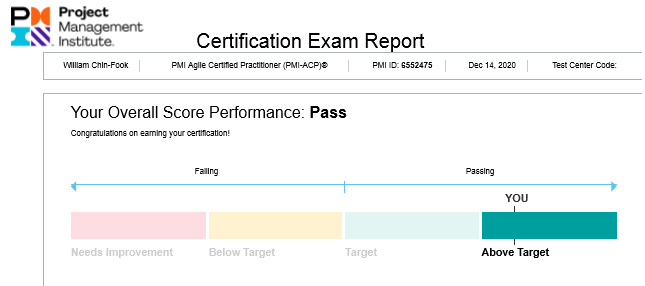
Note, for those who want to skip the sob story, click here to jump to the table of contents / exam study guide. You can also view my LinkedIN and / or look me up in the project management institute exam registry (leave the country dropdown blank) and search for my name “William Chin-Fook”. Overall, it was a great feeling to be able to get that PMI-ACP certification because it truly instilled in me strong core agile principles and allowed me to really delve into the art of agile project management. Although getting the paper was good (it certainly felt great after 200 hours of studying), having the knowledge and seeing the results when applied to an agile delivery team did wonders.
Update 2023:
For high quality PMI-ACP exams and training, you can try PM Prepcast. These courses most definitely helped me pass the PMI-ACP and they have are helping me as I work through my journey to get the PMP as well. While you don’t need to buy everything, I would recommend:
- Their exam simulator (I have never seen questions so similar to the ones I’ve seen on the exam)
- Their basic course (It’s a well written breakdown of what to study and how to study for the PMI-ACP)
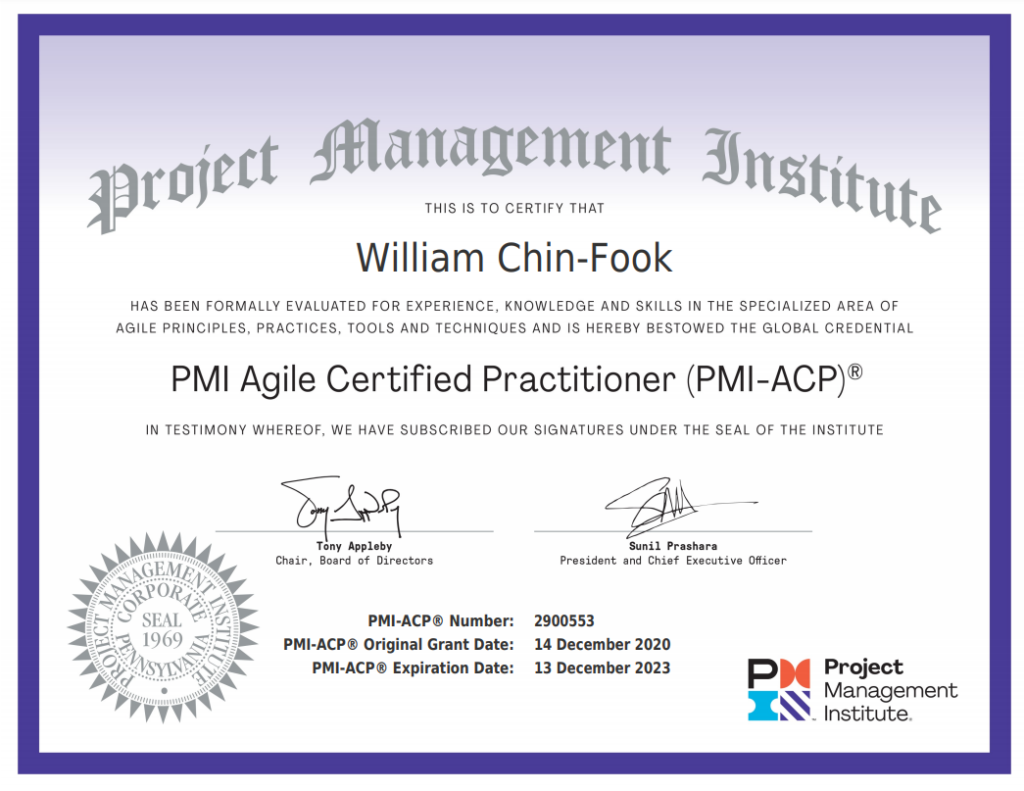
What is the PMI-ACP?
The Project Management Institute (PMI)’s Agile Certified Professional (ACP) designation is a designation given out by the PMI to those who can prove with experience (and a 120 multiple-choice test) that they understand the basics and fundamentals of agile for software development. I say software development because my experience with the exam revealed that most of the questions have to do with that specific discipline.
Why did I write this review on the ACP?
I believe Agile (more specifically the pillars of scrum (transparency, adaption and inspection)) can improve processes, people, and society as a whole (or I might have just drank more agile kool-aid than intended 🙂 ). I’m also writing this because I believe that a lot of those “courses” that state you can pass the ACP for $1,000 USD are overpriced. All it took for me was a little discovery, dedication, and research to find the right courses and tools to pass the PMI-ACP (for me, the total cost was under $200 USD).
Do note that my company compensated me for the certification if I passed, so passing this exam truly did cost me less than $200 USD. It was also super important for me to pass and not let down my team!
This review is through and through a collection of my experiences and what I went through to pass the PMI-ACP while having a full time job, a freelance consulting gig, and a family. I also snuck in a little bit of Xbox Series S, StarCraft II, and time to work out, so it’s totally possible for you to dedicate a dozen hours a week for a few months to study and pass this exam.
Disclaimer: I’d like to say that if you follow this guide and all of the supporting documentation that I provide to a tee, you have a very likely chance of passing the PMI-ACP with all Above Target (75% or higher). However, this is not a guarantee as I had also been a part of an agile delivery team for approximately three years prior to writing this exam, so a lot of agile terms like “process tailoring”, “scrum”, “KanBan methodology”, “refactoring”, and “tech debt” were already second nature to me. I also did my exam during COVID-19, so I did it remotely with Pearson VUE. This took a lot of environmental pressure off me as I have a comfortable office in which I studied and prepped. This also helped me successfully pass the exam in an environment that was familiar and calming.
Note: There are affiliate links below to Udemy and other parties that I may receive commissions from. However, I highly recommend these products due to the fact that I’ve audited or taken them before. Please click through and support my website so that I don’t need to run Ads :).
Who is this review for?
This review is for anyone who wants to study for the PMI-ACP (in this new decade), take the exam and pass. This agile certification is a great achievement to have as it allows you to prove to an internationally renowned organization that you have a good grasp on agile methodologies (and not just Scrum, but Kanban, XP and even some DSDM). This is in contrast to certifications like the CSM and CSPO which have open book tests and might not necessarily be the most challenging due to that.
Your eligibility to take and pass this exam is based off the necessary criteria to take the exam. Ultimately, you want to have been a part of an agile team and actually practiced some agile methodology before.
If you’re a looking to qualify your skills in agile and you have certifications like ITIL, CSM, CPSO, SAFe 5 (Lean) or even the PMP – consider trying to pass the PMI-ACP. It’s a great compliment to any of these other certifications.
So, without further adieu, here is my study guide for the PMI-ACP in 2020 / 2021 (referencing the PMBOK Guide 6 and 7).
PMI-ACP application
But first, here’s what you must have to even take the PMI-ACP test:
Prerequisites:
- Secondary degree education
- 21 contact hours of training in agile practices
- 12 months of general project experience within the last 5 years. A current PMP® or PgMP® will satisfy this requirement but is not required to apply for the PMI-ACP
- 8 months of agile project experience within the last 3 years
Be prepared that the certification exam has 120 multiple-choice questions and you have three hours to complete it. Also, to maintain your PMI-ACP, you must earn 30 professional development units (PDUs) in agile topics every three years (only applies after you pass the criteria above).
I had the relevant project management experience, as well as agile project management experience building web / mobile apps with different agile delivery teams – so writing my application to apply for the exam wasn’t too difficult. When writing your PMI-ACP application, make sure to do the following:
- Be detailed about your experiences, and bring up how you lead your team and in what capacity as an Agile project manager (PM).
- Bring up specific dates and times and outcomes of the project.
- Mention ways that you were a “servant leader”, and allowed your team to “self-govern”, “self-organize”, etc.
- Try to collate your experience with agile experiences as best as you can.
For my 21 hours of PDUs, I was able to find a rather decent Udemy.com online course led by Joseph Phillips who breaks down how to pass the exam quite well.
PMI-ACP Exam Requirements: Here’s the PDF as per the PMI exam outline (note, this is not my content but the PMI-ACP’s documentation).
The ACP breaks down the exam into 7 specific disciplines. In this review, I will outline my opinion of the most important aspects of the 7 disciplines to pass the exam. This is due to the PMI requiring you to read A LOT of books to gather the information. I don’t recommend reading all of the books as many of them are old and outdated.
If you’re also interested, I’m currently studying for the PMP which will have my notes, review and even a Udemy PMP best courses list!
7 Domains of Practices for the PMI-ACP® Exam According to PMI
Domain I: Agile Principles and Mindset (16% of PMI-ACP® Exam questions)
Domain II: Value-driven Delivery (20% of PMI-ACP® Exam questions)
Domain III: Stakeholder Engagement (17% of PMI-ACP® Exam questions)
Domain IV: Team Performance (16% of PMI-ACP® Exam questions)
Domain V: Adaptive Planning (12% of PMI-ACP® Exam questions)
Domain VI: Problem Detection and Resolution (10% of PMI-ACP® Exam questions)
Domain VII: Continuous Improvement (Product, Process, People) (9% of PMI-ACP® Exam questions)
My PMI ACP training study guides
Here’s an overview of my exam preparation for the PMI-ACP and how I passed:
- For my 21 hours of PDUs and initial studying, I used PMI-ACP Exam Prep for PMBOK 6 (https://www.udemy.com/course/pmiacp_21pdus/) for $11.99 USD or less.
- The same provider of the Exam prep above had decent practice exams, not exactly indicative of what’s on the exam, but very situational and will get you in the mindset to pass the ACP. See more on this below (https://www.udemy.com/course/pmi-acp-practice-exams-pmbok-6/ for $11.99 USD or less).
- I also found a random guy on YouTube. I took a few notes following this guy over the core seven disciplines. It was nice to get a less formal perspective and some of the things that he referenced did show up on the exam. (Free)
- PMI-ACP Exam Prep: Read this book. It was amazing. Along with Joseph Phillips’ digital course, and this textbook and its questions, you should get a core understanding of what’s required to pass the ACP (Note: I took about 200 pages of notes and had roughly 1,000 cue cards at the end of my studying) – $69.99 USD
- PM Prep-Cast (https://www.project-management-prepcast.com/). These guys ABSOLUTELY kill the “situational questions”. For $99 USD, you get access to 480 questions that I highly recommend you take advantage of. See more on this below.
- I read over the Agile Practice Guide, published by the PMI-ACP. There’s A LOT of good stuff in here, but the writing isn’t the greatest. (Free)
Total spent: Less than $200 USD!
Here’s a more detailed breakdown of each of the above six points.
1. Review of Joseph Phillips’ Udemy PMI-ACP Exam Prep (21 PDUs)
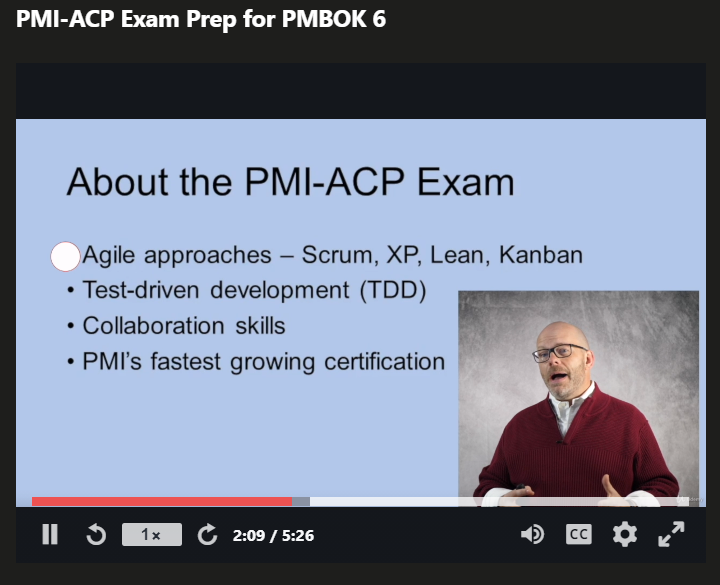
Overview:
This course is a breakdown of every main domain required for the exam, as well as a ton of detail in certain things like: “Agile Accounting IRR (Internal Rate of Return), NPV (Net Present Value), ROI (Return On Investment), EVM (Earned Value Management), equations like CPI (Cost Performance Index) and BAC (Budget At Completion), which are more attuned for traditional project management.
Pros:
- Detailed explanations of specific scrum / agile rituals like retrospective and sprint planning.
- A strong breakdown of scrum roles, XP roles, KanBan and other core agile practices and principles (osmotic communication, tacit knowledge, agile planning, colocation, servant leadership).
- Many other things like stages of a team (forming, storming, norming, performing) and learning cycles for adult learning with respect to Shu, Ha, Ri.
- It comes with almost a full practice exam at the end!
Cons:
- Seems to focus on scrum A LOT, whereas from other places and even on my exam there were a number of XP-related questions and questions relating to DSDM and crystal. While Joseph touches on these, if you have no experience in XP or KanBan – you should brush up on those disciplines.
- Some of the questions after each unit are memorization-based and basically fill in the blank answers, which is unlike the exam.
- He covers a lot of content that is from the PMBOK guide and not applicable for the exam. Caveat to this is that this information is useful for the PMP and overall as a project manager in the real world.
Verdict:
Overall, this course is definitely worth the money (whether you have a business account or individual account). It’s also not a bad way to earn your required PDUs and get your feet wet for the exam material. If you can master the information (I took two notebooks worth of notes), then you have a good chance of just passing the PMI-ACP. Try to concentrate on things that are outlined in the ACP exam outline and collate the proper ACP exam content with Joseph’s slides and information. Tip, try not to use your notes for the final practice exam – try to take it as if the test was real. If you want more information on Udemy courses and whether they’re worth it – consider reading my article!
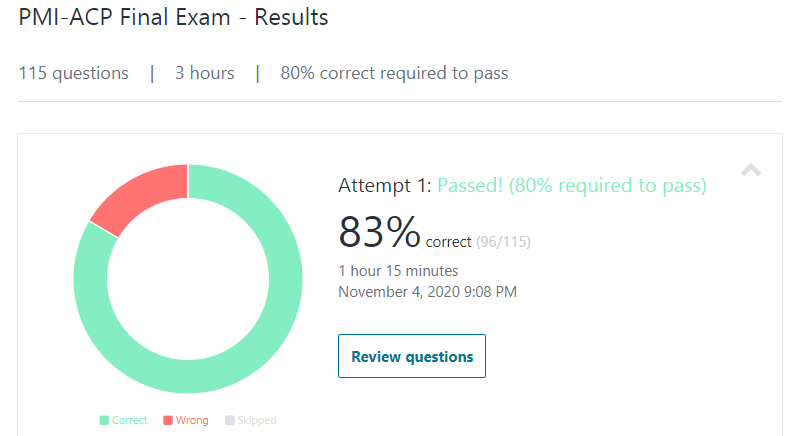
2. Review of Joseph Phillips’ Two Practice Exams
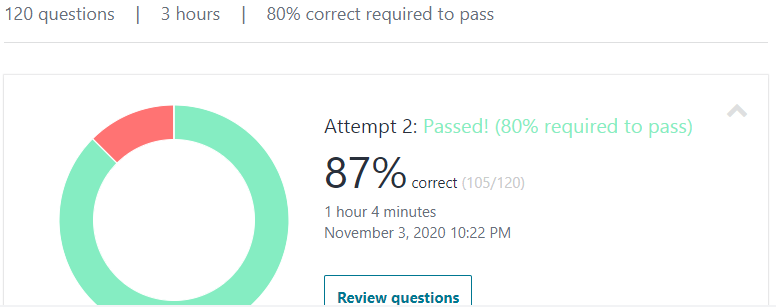
The first practice exam was harder than I expected
Overview:
Once again, not bad content and is somewhat indicative of what you might see on the exam. Having the 120 questions is awesome, as it will give you an indication of whether you have the chops to pass the exam. It will cover everything in Joseph’s 21 PDU Udemy course on top of a few little nuggets of information that he failed to mention in his course 😉. Make sure to brush up on your terminology as a lot of the questions will heavily weigh in on that.
Pros:
- 115 questions and both are pretty indicative of the length and feel of the exam.
- They also cover a wide range of testable material from the exam, and questions / things you might definitely see on the exam as well.
- Some questions have a very PMI exam feel, and what I mean by this is that I regularly saw two questions that were absolutely positively wrong, and two that could be right (so you need to choose the best one).
- You can take the practice exams over and over again, meaning you can learn the concepts behind each piece of content.
- You can reach out to the TA if there are any errors with the exams.
Cons:
- Some answers are clearly wrong, and I ended up correcting one for Joseph’s TA (See here: udemy.com/course/pmi-acp-practice-exam/learn/quiz/4508588/results#questions/13286264 – you need to have purchased the course).
- Some of the questions are WAY too easy and the answer is just sitting there in plain sight.
- There’s diminishing return to writing the exams over and over again because you can memorize the answers eventually.
- While the explanations are good, I would have loved to see some references on where they pulled the answer for (especially when there’s a degree of ambiguity between two answers).
Verdict:
Worth the $14.99 USD and the content is similar to Joseph’s PMI-ACP Exam Prep course (except that they are a bit more recent, coming out in late 2018). The questions are more closely structured to what you’ll actually see on the PMI-ACP exam and are more indicative of the exam than most practice tests out there. Despite there being some wrong answers, Angela the TA does a good job at responding to everyone with inquiries. Overall, definitely worth the buy – highly recommend these tests as your first pass after the 21 PDUs udemy course.
3. Best PMI-ACP prep channel

Not much to describe here, I feel like I could have scored marginally the same doing this than if I didn’t. The takeaway is that you should get some perspective from someone who has taken the exam and passed, but is not an agile coach and you aren’t paying them for information. The reason for this is it will be an unfiltered review of the information. Here’s the YouTube channel if you’re curious!
4. Review of PMI-ACP Exam Review: Rita Mulcahy’s from RMC Learning Institute, written by Mike Griffiths
Overview:
A company that prides itself on helping individuals get certified since 1991 to 2021, Rita Mulcahy is the owner and operator of this company and website. With Mike Griffith on the team – someone who helped grow agile from infancy in the early 2000s, create DSDM, and write the previous four PMBOK guides – you know the content you’re reading will be high caliber. They have study guides, practice guides, training schedules, and courses.
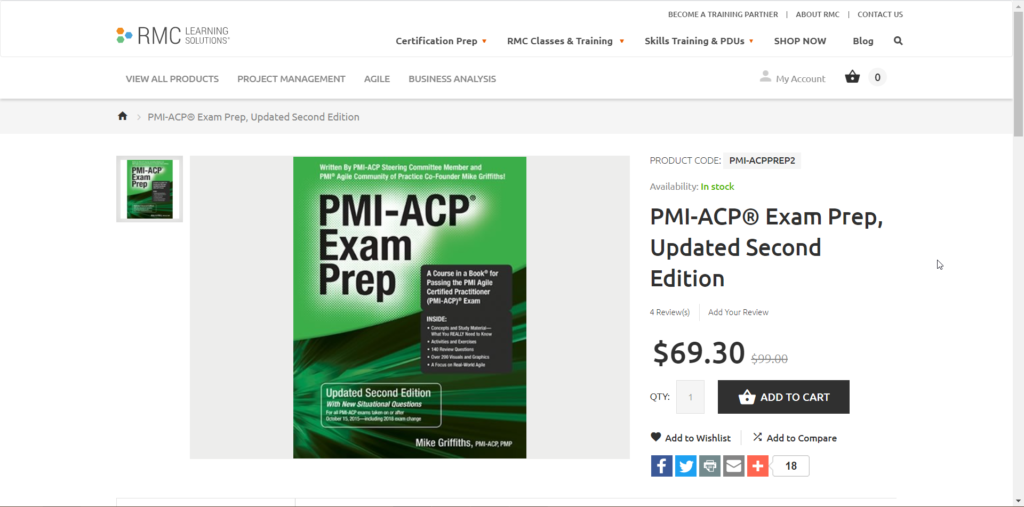
Pros:
- Tons of comprehensive information and a lot of subject matter expert knowledge. The textbook has useful hypotheticals and questions that are configured very similar to the PMI-ACP.
- Comes with a practice exam, which is basic but still good (more informational and less situational).
- A LOT of the content outlined in this textbook was on the exam.
- Has a lot of add-ons like a practice exam (which you need to reference information from the textbook to get access to), practice questions, and extra content that you need to pay for (I didn’t).
- Lots of referencing to the original textbooks outlined in the ACP exam, so they’ve done all the heavy lifting for you when it comes to consolidation and studying.
- The chapter reviews are a GREAT way to cement the important information (see screenshot below).
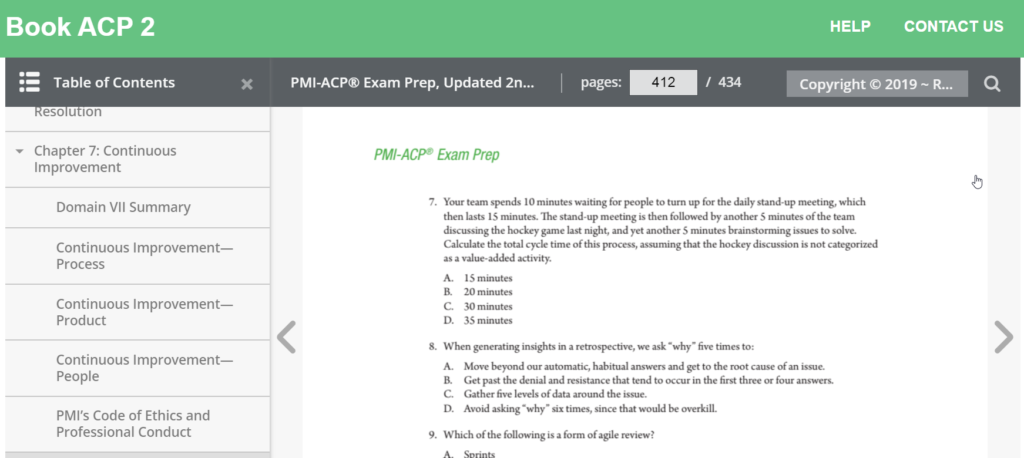
Cons:
- You don’t own the textbook, it’s an online SAAS subscription. I think a six-month subscription should be long enough if you can dedicate a 100 hours to study.
- It can get pricey and you can overpay for the simulator, prep classes, textbook, and all of the other corresponding support tools.
- You need the internet to connect to their tool (https://exams.rmcls.com/book/bk-acp-2).
- Most of the add-ons and classes can be costly (an upwards of $1,000 USD for everything).
Verdict:
Read this bad boy if you want to pass. I chose the $69.99 USD for six months option, which left me with more than enough time to review and supplement my notes with everything that Joseph Phillips had already reviewed (roughly one month). There is lots of extra theories in this textbook (including theory of constraints, Herzberg’s hygiene theories, and many others), some of which could be on the exam but I didn’t see anything on mine. My suggestion: Know it and understand it as it might help you in your career, but don’t memorize it.
5. Project Management PrepCast – PMI-ACP Exam Simulator
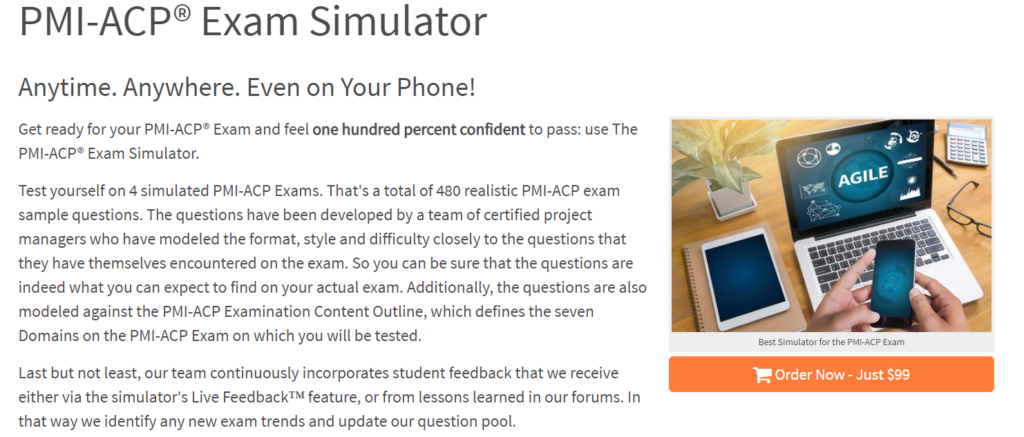
Overview:
PrepCast is a portal for PMP, ACP, and CAPM that will train aspirants to get these certificates while providing course and study material, practice exams (in bulk), and a forum to converse with other aspirants and those who passed the relevant certificate exams.
Pros:
- You can get your contact hours (21 PDUs) by buying the PrepCast basic (which is only $229) USD, with the ability to upgrade for $50 USD more. While I haven’t tried the training specifically, the reviews seem relatively positive overall. If it’s anything like the practice exams, then you can’t go wrong.
- The practice exams are single-handedly one of the best resources I used to help me pass the PMI exam. While they are $99.99 USD for six months of use, the exam questions are almost an exact replication of the type of structure you’ll see on the exam. That being said, it tests an EXTREMELY wide breadth of questions many of which I never accounted on the real PMI-ACP exam.
- PrepCast’s exam interface is also very similar to Pearson VUE (and I did my exam remotely during COVID-19 ), so it made navigating through Pearson VUE very easy. Note: Pearson VUE is the remote testing software that the PMI uses as of 2021, so this could change.
- Each multiple choice question has a detailed explanation on why the answer is wrong or right. These explanations are pulled from the PMI Agile Guide quite a bit and usually supplemented with books (that are also suggested for reading by the PMI) such as, but not limited to:
- Agile Estimating and Planning (Mike Cohn)
- Agile Retrospectives: Making Good Teams Great (Esther Derby, Diana Larsen and Ken Schwaber)
- Agile Software Development: The Cooperative Game (Alistair Cockburn)
- User Stories Applied: For Agile Software Development (Mike Cohn)
Cons:
- You only get a certain amount of time with the test questions (however much you pay for, and if you pay to add more (e.g., an additional month) for a nominal fee).
- The questions end up becoming too easy after you do them once or twice. I found myself (despite out loud trying to rationalize why a certain answer is more correct), instinctually going to the right answer with no thought. Although this could be by design, as it could also mean that I have become proficient or competent in the content 😊 (pulling from Dreyfus’ model of skill acquisition) – it’s still annoying that the content does not refresh our update.
Verdict:
Get this if you want a realistic set of exam questions that will help you pass the ACP (or PMP for that matter). Cornelius Fitcher is the owner of OSP International LLC (which owns PrepCast) and does a great job emulating what’s on the ACP and PMP exams. My only gripe with this service is that after you master and pass the exam questions and information, you end up not needing the software all that much afterwards. I would suggest to OSP International to consider refreshing their questions in their test bank or cycling through new ones.
Get this if you want to pass the exam 🙂
6. Agile Practice Guide by the Project Management Institute

Overview:
Last, but certainly not least is the official agile study guide handbook from the PMI in association with the Agile Alliance. It’s an approximately 300-page document that is supposed to encapsulate much of what’s on the PMI-ACP exam, but is also built to empower project managers to be more agile in their approach (especially when they’re working on empirical or non-defined processes). Note, I do not own this document; I found it online from another WordPress site!
Pros:
This book has a lot of comprehensive information on high level stuff including: Definable work vs. high uncertainty work (common theme in agile, where agile fits uncertain work better than traditional project management); characteristics of predictive, iterative, incremental and agile life cycles; process tailoring; servant leadership; team composition (roles, structures, workspaces (colocation, osmotic communication)); implementation of agile in an organization; and the relevant practices.
The appendices are a great source of information! They help summarize all of the major features and characteristics, and values and roles of each major agile / agile-related discipline (scrum, XP, lean, KanBan, DSDM, crystal, FDD, LeSS and even SAFe (scaled agile framework)).
Here’s a copy of the PDF that I found online. I do not own this PDF – I just want to spread the Agile concept to more people!
Cons:
It’s quite boring and dryly written. I felt that there could have been more “practical” knowledge added to this. However, I realize this is a handbook for less agile PMs, and therefore my interpretation of it is an anecdote.
Much of the material in this textbook I found supplementary and I didn’t come across it on my exam.
Verdict:
I would use the MoSCoW prioritization for this reading if you’re pressed for time. This book is a potential “should” or “could” read, whereas the stuff above I would say is a “must-have” if you intend on passing the ACP. That being said, I feel that as I progress through my career as an agile product / project person, I will refer back to this book as a useful source of information. Its purpose may not be meant for aspirants of the ACP, but more for those who truly want to become more agile in their project management careers.
Overview of my personal PMI-ACP exam review study material
As explained in almost all of the verdicts above, all of my study resources helped me study and “ace” the ACP in some shape or form. I compiled detailed notes (some just for my own knowledge as well) and wrote out approximately 1,000 cue cards, which helped me grasp and partially memorize the relevant terms and features. Coupled with my practice exams and corresponding marks, I believe this is 80% of the reason why I passed the PMI-ACP in my first go.
Here are some tips before you write the exam
- Build a study deck of material and keep iterating on it as you find more material. If you read Mike Griffith’s book or do a comprehensive course outlining a lot of the material and take good notes, you should have good firsthand knowledge of 75% of what’s on the exam.
- Don’t study the night before, just like an athlete you want to rest your body before the big event.
- The time when you studied (for me it was in the morning and in the evening), should be the time you write the exam. Your body will be synced with that time because you’ve built a habit.
- Do as many practice exams as possible. I’ll add a list of practice exams you can take that I think are reliable (like Prepcast). I did many different practice exams across the internet and a lot of their content did not correlate at all with the ACP.
- Do a small practice exam an hour or so before the exam. I did randomized 20 questions on Prepcast 20 minutes before the exam so that I could get my brain juices flowing. I think this helped a lot.
- Once you think you’re ready to take the exam and you’ve studied enough, set up the time and build a routine around the exam in a week or two leading up to it. My routine on the weekdays was the following:
- Wake up and walk the dog (6 a.m. to 7 a.m.)
- Exercise (usually interval training) (7 a.m. to 7:30 a.m.)
- Eat breakfast (7:30 a.m. to 7:45 a.m.)
- Do some practice questions / study (8 a.m. to 9 a.m.)
- Work (9 a.m. to 5 p.m.)
- Study (5 p.m. to 6:30 p.m.)
- Dinner and other stuff (6:30 p.m. +)
- Sleep (10 p.m. to 6 a.m.)
On the weekends, I was all over the place (family, life etc.), but on weekdays the above schedule was pretty firm. It helped me set a cadence for the exam and my body was acclimatized to eventually writing it (which I wrote at 10 a.m.).
If you’re taking the exam remotely, make sure to test the digital platform beforehand, and have a backup computer just in case. Pearson VUE (the tool I used to write the exam) glitches on my computer quite a bit.
Taking the PMI-ACP exam tips
- Reread all questions after you’ve read them once.
- Empathize with the scenario and try to put yourself in the project person’s shoes.
- Choose the most textbook-based agile answer, not necessarily the most pragmatic one.
- Leave time for review (honestly though, I was pretty tired at the 110 question mark – so I didn’t review most of my answers 😊 ).
- If remote, make sure you use the washroom before you do the exam.
If you don’t pass your first attempt
If you don’t pass your first try at the PMI-ACP don’t fret. Not everything is meant to be – and you may have no thoroughly covered what you should have.
Here’s what you must do, if you don’t pass the first time:
- Firstly, go through the Domains 1 to 7 – see where you were your weakest and where you may need to improve.
- Review those domains, were there any fundamentals or terms you just did not recognize with respect to those particular questions?
- Review RMC’s PMI-ACP e-book for those weak domains, and train on your weak domains on PrepCast exam simulator, isolating just those domains.
- Make sure that you do this review for any domain you didn’t get “above target” on. Ultimately, every practice exam that you take should have you receiving 83% or higher since the passing grade appears to be 70% – 80%.
Was the PMI-ACP worth getting from my point of view?
I’ve been asked by my friends, family and colleagues whether I think the going after the ACP was worth it. Overall, including the expenses (~$200 USD) my time, hundreds of hours and the opportunity cost of that time (working on my own personal website to generate revenue or my side gigs) I estimate that it cost approximately $5000 – $7500 USD. While I may have over-studied, you never want to achieve the bare minimum on these exams.
Most free pmi-acp guides, bootcamps or even courses on Coursera or Udemy will boast that you only need to take their courses to pass the exam, which I don’t believe is possible.
Here is how the ACP exam helped me in my career:
- New ideas when it came to brainstorming and collaboration – Nothing the ACP curriculum brings up is brand new or innovative on it’s own, the genius of the exam is it forces you to understand multiple agile methodologies and concepts together. This provides you with the knowledge to tailor.
- Stronger agile recognition than my peers – While this may not apply to every single peer you have, many of your peers may understand agile from being second hand taught from their organization or from a crash course like CPSO or CSM certification. As stated before, these certifications are rather easy to achieve since there is no challenging exam to write or criteria necessary (and if you’re unlucky a project audit) to overcome.
- More competitive in the job market – Many project manager positions actually prefer to have a PMI certification vs. a Scrum alliance or Pragmatic institute due to the intensity of the exam, just compare a PMI search vs. Scrum alliance one. The one caveat to this is, more hiring managers and HR folks seem to recognize CSM or SAFe5 over the ACP (due to it’s more general nature of agile training and that it’s completely eclipsed by the PMP in recognition). Comparing how many jobs ask for “Agile certified practitioner” vs. “Certified scrum master” on LinkedIn yields the stark difference between industry needs (see screenshots below). However, many organizations recognize the “PMI” name but mostly due to the PMP and CAPM.
- Process tailoring – In my mind, this is the most important. The ACP taught me a lot about Lean, Kanban and XP (extreme programming) of which I knew way less about verses Scrum. Due to this infusion of knowledge, I’ve been able to incorporate pretty cool software development practices into my more mature agile teams (ExtremeScrum is what I like to call it).
- Acclimatize to PMI exams – While it’s a small positive, being able to sit, pass and overcome a PMI exam is no small feat. It has shown me how the PMI structures it’s exams and has made me more confident in taking the PMP (which I will be doing later this year) and eventually the PmgP.
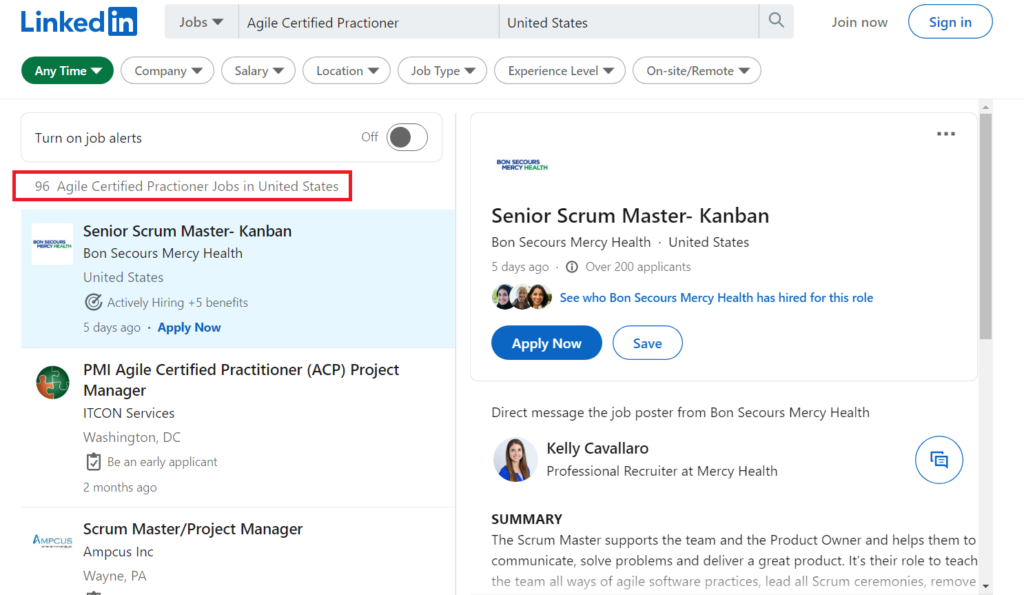
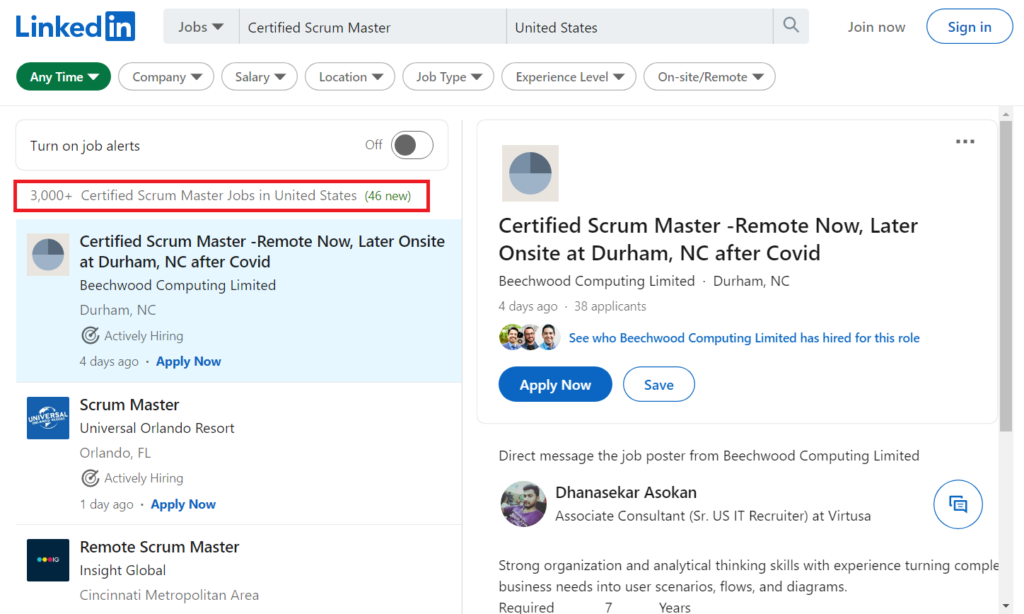
Ultimately, I only got my certification a year ago and have yet to see the full extent of what it can yield me. The one thing I can say is that studying for the exam has definitely changed my mindset and I have indeed tried to embrace agile more holistically as a person, even outside my work. My advice, if you want to learn about agile and maybe add a nice resume bumper this exam is for you. However, I would advise taking it if your only motivation is to get a job. Since it’s not as renowned as the CSM or PMP, you may struggle to resonate with recruiters and hiring managers.
Best of luck to you, and let me know in the comments if this was helpful in a) pointing you in the right direction to study, and b) passing the exam! If you’ve used this guide, feel free to leave a comment – I make zero money off this article.
Frequently Asked Questions (FAQs) about the PMI-ACP
According to the PMI, there were over 740,000 PMPs certified globally in 2018. A number of websites say that there are roughly 30,000 to 35,000 ACP holders (making it the third largest designation) in 2019. It’s important to note that with the move to online, growth has probably skyrocketed in 2020 as compared to 2021, meaning there could be around 50,000 ACP designation holders or more today.
There are 120 questions on the PMI-ACP exam, broken down into seven domains, which are outlined the ACP handbook. However, the questions regularly overlap despite being specific to their domains.
The PMI-ACP may be one of the hardest agile exams on the market. That being said, after 100 hours of studying, you should be able to grasp the main concepts and pass the exam. Personally, I would say that it’s easier than the CFA level 1 and PMP.
PMI-ACP stands for Project Management Institute – Agile Certified Practitioner. It’s a designation awarded to those who pass the criteria and maintain the Personal Development Units (PDUs) every three years.
The ACP has been said to provide a 20 to 30% rise in salary for those who have it vs. those who don’t. The true value of the ACP is it’s in-depth analysis of many agile methodologies, frameworks, and the core fundamentals of agile.
You don’t need to renew your PMI-ACP certification per say, but you need to get 35 PDUs every three years to maintain your designation. You can also be audited by the PMI-ACP.
To take the exam, it costs $495 USD for a PMI non-member, and $435 USD for a PMI member.
This is really interesting, You’re a very skilled blogger.
I have joined your rss feed and look forward to seeking
more of your great post. Also, I’ve shared your website in my social networks!
Hey,
I have bookmarked your article. Loved it. I have a question though. So I first finish the training for the 21 PDUs and then apply in PMI? Am not a project manager yet and thought of pursuing PMI-ACP to move up the ladder. Am a technical lead currently leading an automation team for more than 5 years. We do follow agile principles like daily standup/restrospections. Question is, do they reject applications? I was wondering if my efforts will go in vain.
Thanks
Hi Madhubala,
Thanks for the bookmark and link. I need to approve your comment before it showed – you wouldn’t believe how much spam I get :).
So regarding your questions, let me break it down question by question and I’ll try to answer the best I can:
So I first finish the training for the 21 PDUs and then apply in PMI?
Yes, you do the 21 PDUs and then subsequently apply to the exam. It’s almost like a soft proof of training and understanding, so that they don’t have unverified candidates applying to the exam. All the requirements to take the exam are here: https://www.pmi.org/certifications/agile-acp
Am not a project manager yet and thought of pursuing PMI-ACP to move up the ladder. Am a technical lead currently leading an automation team for more than 5 years. We do follow agile principles like daily standup/restrospections. Question is, do they reject applications? I was wondering if my efforts will go in vain.
Honestly, despite you not being a project manager if you’ve lead a team and shipped products / projects successfully – I would still apply. They do reject applications and will randomly audit your project experience by contacting your team members and manager. Here’s the walkthrough for that – https://www.pmi.org/-/media/pmi/documents/public/pdf/certifications/audit-instructions.pdf. There’s also an updated section about their FAQ.
When applying, I would do the following if I was in your shoes.
A: Outline a project that you ran in detail, from ideation to delivery. So whether it was a website rebuild or a new application / service.
B: Include any agile experience at all, including the concept of “being agile”, not “doing agile”. You want to be able to show the application reviewer that you understand the purpose and concepts of agile, not necessarily that you just do the rituals. So since you’re a technical lead, I would focus on XP characteristics (Analogies, Refactoring, Clean coding standard, Continuous integration etc..) if you have those skills and understand them. It sounds like you’re doing Scrum (or some sort of hybrid), but might not necessarily be leading the team. Note: the requirement is “8 months of agile project experience within the last 3 years”, so you only need to have experience – not be leading. For the one year of experience in leading projects you will need to convince the application reviewer that you’ve lead projects.
I hope this answers your questions Madhubala, drop more comments as you progress through the training or need to top-up on anything!
Love the website, what is the template you have used?
Hi Craig,
Thanks for reaching out! While this has nothing to do with the ACP, I used a broad template called Astra and we coded a number of unique .php templates.
The PMI-ACP® credential is the Project Management Institute (PMI) fastest growing credential. “ACP” is short for “Agile Certified Practitioner“ the credential tests for and demonstrates understanding and experience with agile approaches. Here is what you need to know as you begin your PMI-ACP certification. journey.
Super interesting and detailed breakdown of each part into 1 post.
Question – Do you need to turn on webcam during the exam? Do you need to share screen? You can’t type right? just using mouse
Hi Liam,
Yes you need a webcam during the exam.
You’re using a mouse, but you will need a keyboard to log into Pearson Vue (at least the software that I downloaded).
There’s no need to share your screen because the software automatically has the proctor observing you and your test.
The way that I communicated with my proctor is an instant messenger, especially when I needed to use the washroom :).
There’s a rule for the ACP that you’re not allowed to leave webcam view for penalty of failing the exam.
Let me know if you have any other questions!